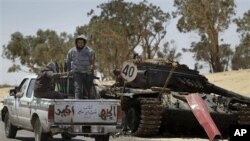A delegation from the African Union is trying to negotiate a cease-fire in Libya, meeting with Libyan leader Moammar Gadhafi and members of the rebel Transitional National Council.
NATO airstrikes appear to have blunted a fresh attack on the rebel-held eastern city Ajdabiya, but with a no-fly zone appearing to make little difference in stopping the fighting in Libya, the international community has stepped up its diplomatic efforts to obtain a cease-fire.
An African Union delegation, with leaders from South Africa, Mauritania, Mali, Uganda and Congo, says it wants an immediate end to all hostilities. It also is seeking to provide a regular supply of humanitarian aid and the beginning of a dialogue between the Libyan government and its opponents. The African envoys say Libya also should plan for a transition period ushering in reforms.
Such talk has had little effect on rebel leaders, who maintain they will not settle for anything less than Colonel Gadhafi's departure.
The African Union and Turkey, which is also pushing a diplomatic solution to end the conflict, are widely viewed with suspicion in eastern Libya as being too close to Colonel Gadhafi and the oil wealth his government represents.
But rebel media spokesman Mustafa Gheriani says the Transitional National Council has yet to hear exactly what the various diplomatic initiatives entail. "At the present time it is very difficult for us to say what the TNC is thinking or what their comment is going to be. So we will just have to wait for them until they receive those formal proposals and we will see what their response will be," he said.
The rebels have said they would respect a cease-fire if government troops withdrew from the positions they control, an unlikely event. Colonel Gadhafi has declared a cease-fire before, but his forces continue to fight.
The government appeared to offer some concessions, with talk of parliament discussing greater freedoms and the possibility of a new constitution.
In addition to the fighting in Ajdabiya and nearby Brega, rebels continued to fight with government forces at Misrata, the last rebel-held city in the west. A Red Cross ship was able to dock Saturday, bringing much needed medical supplies.
NATO says it has destroyed a number of armed vehicles of loyalists forces around Misrata in recent days. But the humanitarian situation remains dire, six weeks after the uprising began.
AU Leaders Call for Libya Ceasefire




